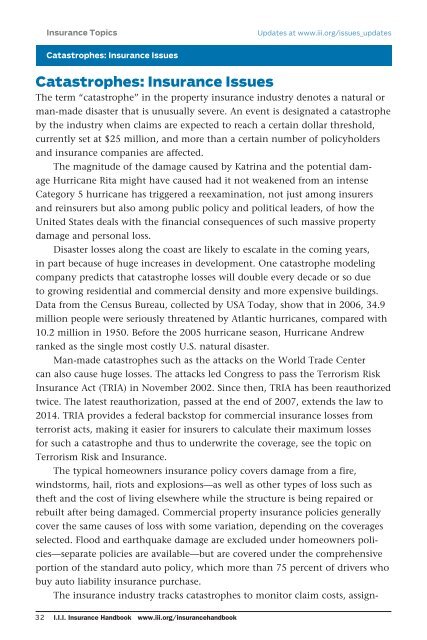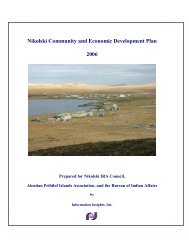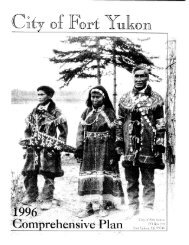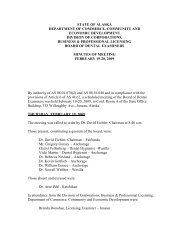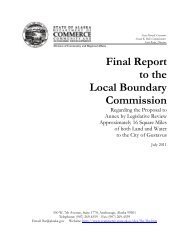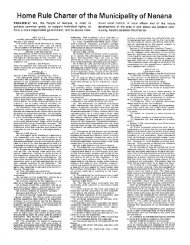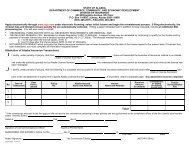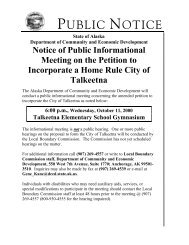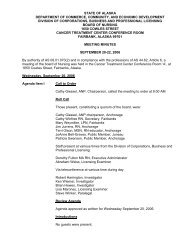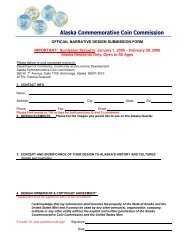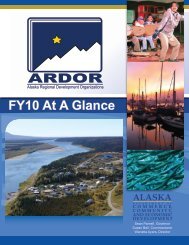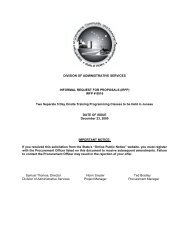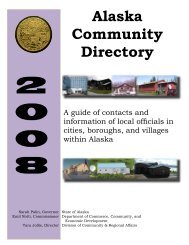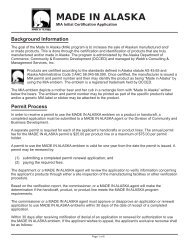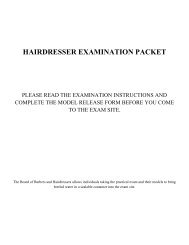Insurance Handbook - Alaska Department of Community and ...
Insurance Handbook - Alaska Department of Community and ...
Insurance Handbook - Alaska Department of Community and ...
Create successful ePaper yourself
Turn your PDF publications into a flip-book with our unique Google optimized e-Paper software.
<strong>Insurance</strong> Topics Updates at www.iii.org/issues_updates<br />
Catastrophes: <strong>Insurance</strong> Issues<br />
Catastrophes: <strong>Insurance</strong> Issues<br />
The term “catastrophe” in the property insurance industry denotes a natural or<br />
man-made disaster that is unusually severe. An event is designated a catastrophe<br />
by the industry when claims are expected to reach a certain dollar threshold,<br />
currently set at $25 million, <strong>and</strong> more than a certain number <strong>of</strong> policyholders<br />
<strong>and</strong> insurance companies are affected.<br />
The magnitude <strong>of</strong> the damage caused by Katrina <strong>and</strong> the potential damage<br />
Hurricane Rita might have caused had it not weakened from an intense<br />
Category 5 hurricane has triggered a reexamination, not just among insurers<br />
<strong>and</strong> reinsurers but also among public policy <strong>and</strong> political leaders, <strong>of</strong> how the<br />
United States deals with the financial consequences <strong>of</strong> such massive property<br />
damage <strong>and</strong> personal loss.<br />
Disaster losses along the coast are likely to escalate in the coming years,<br />
in part because <strong>of</strong> huge increases in development. One catastrophe modeling<br />
company predicts that catastrophe losses will double every decade or so due<br />
to growing residential <strong>and</strong> commercial density <strong>and</strong> more expensive buildings.<br />
Data from the Census Bureau, collected by USA Today, show that in 2006, 34.9<br />
million people were seriously threatened by Atlantic hurricanes, compared with<br />
10.2 million in 1950. Before the 2005 hurricane season, Hurricane Andrew<br />
ranked as the single most costly U.S. natural disaster.<br />
Man-made catastrophes such as the attacks on the World Trade Center<br />
can also cause huge losses. The attacks led Congress to pass the Terrorism Risk<br />
<strong>Insurance</strong> Act (TRIA) in November 2002. Since then, TRIA has been reauthorized<br />
twice. The latest reauthorization, passed at the end <strong>of</strong> 2007, extends the law to<br />
2014. TRIA provides a federal backstop for commercial insurance losses from<br />
terrorist acts, making it easier for insurers to calculate their maximum losses<br />
for such a catastrophe <strong>and</strong> thus to underwrite the coverage, see the topic on<br />
Terrorism Risk <strong>and</strong> <strong>Insurance</strong>.<br />
The typical homeowners insurance policy covers damage from a fire,<br />
windstorms, hail, riots <strong>and</strong> explosions—as well as other types <strong>of</strong> loss such as<br />
theft <strong>and</strong> the cost <strong>of</strong> living elsewhere while the structure is being repaired or<br />
rebuilt after being damaged. Commercial property insurance policies generally<br />
cover the same causes <strong>of</strong> loss with some variation, depending on the coverages<br />
selected. Flood <strong>and</strong> earthquake damage are excluded under homeowners policies—separate<br />
policies are available—but are covered under the comprehensive<br />
portion <strong>of</strong> the st<strong>and</strong>ard auto policy, which more than 75 percent <strong>of</strong> drivers who<br />
buy auto liability insurance purchase.<br />
The insurance industry tracks catastrophes to monitor claim costs, assign-<br />
32 I.I.I. <strong>Insurance</strong> <strong>H<strong>and</strong>book</strong> www.iii.org/insuranceh<strong>and</strong>book


